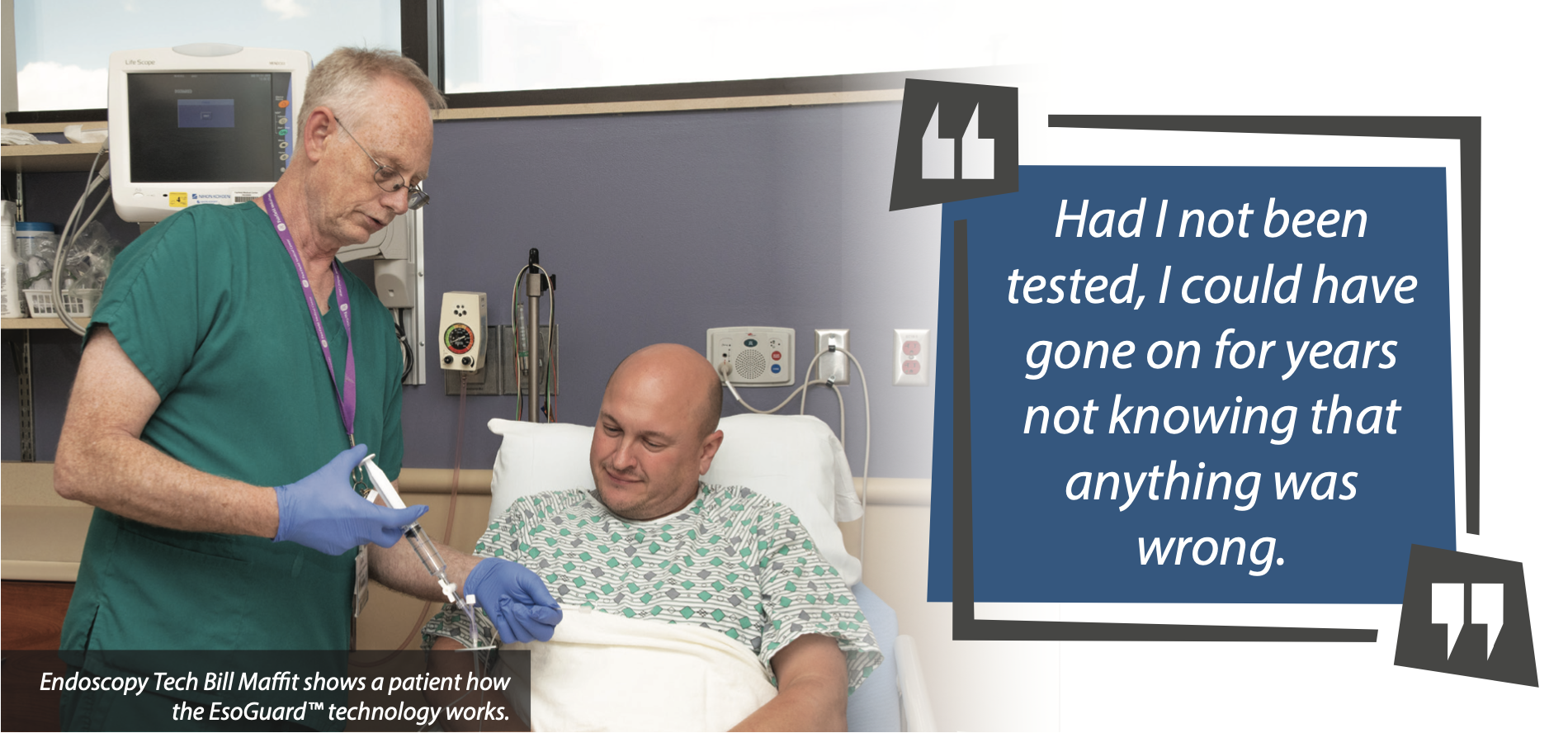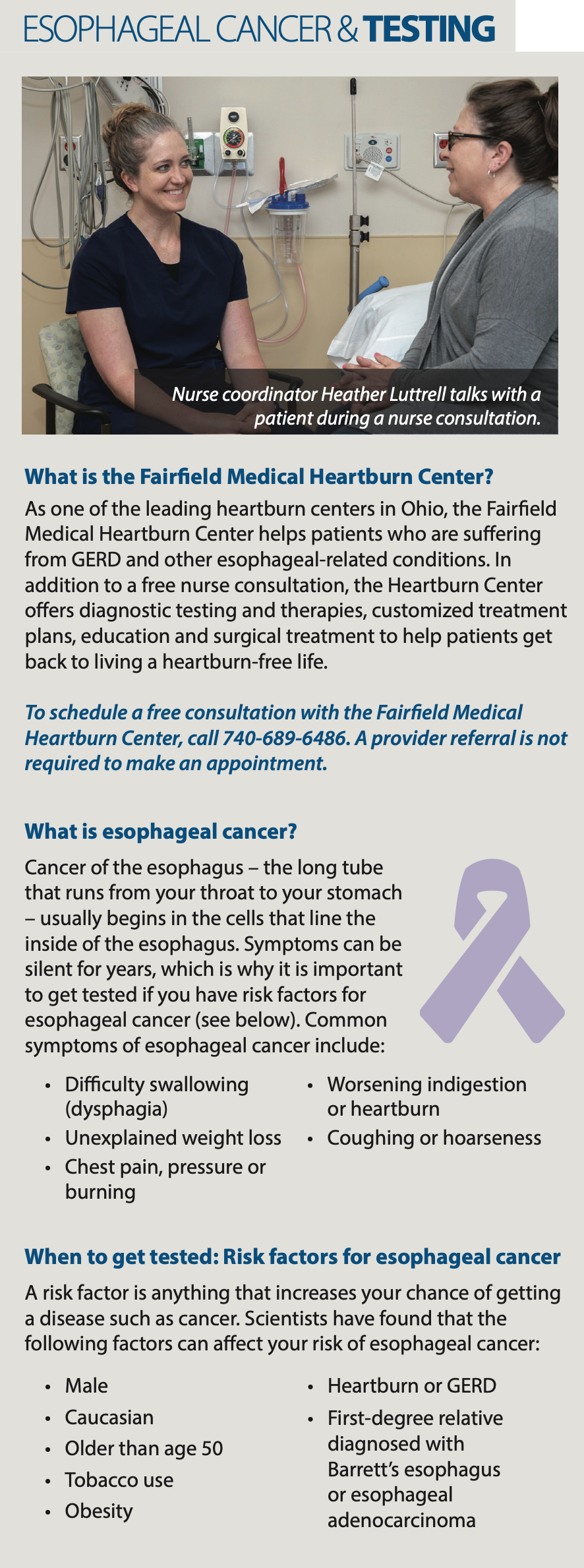Article originally published Fall 2023 in The Monitor magazine.
As an endoscopy tech at Fairfield Medical Center, Bill Maffit cares for patients every day who are seeking relief from persistent heartburn and other unpleasant symptoms of gastroesophageal reflux disease (GERD). Having only experienced heartburn a few times in his own life, it never occurred to Bill that he could have the same condition as his patients – until a new screening test yielded some surprising results.
In early 2023, Bill opted to undergo EsoGuardTM testing, a DNA assessment offered at Fairfield Medical Center that detects abnormal cells in the esophagus,  which is the tube that connects the mouth to the stomach. As a Caucasian male older than age 50, Bill is considered at-risk for developing esophageal cancer, which is what spurred him to get tested.
which is the tube that connects the mouth to the stomach. As a Caucasian male older than age 50, Bill is considered at-risk for developing esophageal cancer, which is what spurred him to get tested.
The EsoGuardTM test takes just a few minutes and does not require sedation. The patient swallows a capsule that is attached to a thin catheter. The capsule is lowered into the patient’s stomach and inflated like a balloon to collect cells from the lining of the esophagus. It is then gently pulled back up so the cells can be sent for testing.
Bill said he was shocked when his results came back positive, meaning that abnormal cells had been detected. He then underwent
an upper endoscopy (EGD) at FMC and had two different types of biopsies taken from his lower esophagus, both of which confirmed a diagnosis of Barrett’s esophagus. Barrett’s esophagus is a condition caused by chronic reflux where the cells in the lower part of the esophagus start to change because of frequent exposure to damaging stomach acid. These initial changes are not cancer, but Barrett’s esophagus is a risk factor for esophageal cancer in the future.
“I used to cough a lot, but never thought much of it or suspected it might be a symptom of something serious,” Bill said. “I would also occasionally have some burning in my stomach but, for the most part, I could eat whatever I wanted.”
Heather Luttrell, BSN, RN, nurse coordinator for the Fairfield Medical Heartburn Center, said it’s not unheard of for patients with GERD to exhibit few if any of the classic symptoms, such as heartburn or reflux. Instead, their symptoms, like Bill’s, might be more obscure. Sometimes significant symptoms don’t show up until the patient’s condition has increased in severity or even progressed to cancer (see box).
the classic symptoms, such as heartburn or reflux. Instead, their symptoms, like Bill’s, might be more obscure. Sometimes significant symptoms don’t show up until the patient’s condition has increased in severity or even progressed to cancer (see box).
“The Caucasian male over 50 demographic makes up a large portion of our patient population, which is at higher risk for developing esophageal cancer,” Heather said. “If you also take into account other risk factors, that demographic becomes even larger, so we are trying very hard to prevent those individuals from falling through the cracks when it comes to testing.”
As the nurse coordinator, Heather does a free consultation with all new patients to the Heartburn Center, regardless of whether they were referred by their provider or self-referred, to learn more about their symptoms. Following the consultation, Heather typically recommends diagnostic testing to examine the patient’s esophagus and uncover the root cause behind their symptoms.
The EsoGuardTM is just one of the testing options offered at the Heartburn Center. It’s a good screening tool for patients such as Bill who are at a higher risk of esophageal cancer and who might experience heartburn occasionally. Patients may also undergo an upper scope (EGD), which allows the provider to examine
the upper part of the patient’s gastrointestinal tract. An EGD is preferred for patients who have already been diagnosed with GERD and/or Barrett’s esophagus.
Once diagnostic testing is complete, Heather works with patients and their provider to come up with a solution. While FMC offers two surgical options for GERD – the Nissen and the LINX® – Heather said she always prefers to explore nonsurgical treatment options with patients first.
“Just implementing some diet and lifestyle changes can be very effective, so I love to start there,” Heather said. “I am not one to recommend surgery right away. I think surgery becomes an option for people after they’ve tried diet and lifestyle changes and have even tried medication, but are still experiencing GERD symptoms frequently, or they’re wanting to get off of their GERD medications entirely.”
For Bill, taking a daily acid reducer has been beneficial in helping to slow any further damage. In addition, he is scheduled to get
an EGD every three years to monitor his Barrett’s esophagus and make sure the cells in his esophagus are not continuing to change. He hopes to continue to use his own experience to raise awareness and spur patients to get screened.
“Had I not been tested, I could have gone on for years not knowing that anything was wrong, only to be surprised by a cancer diagnosis,” Bill said. “I’m very grateful that I found this when I did so I can be proactive and make sure it doesn’t get worse.”